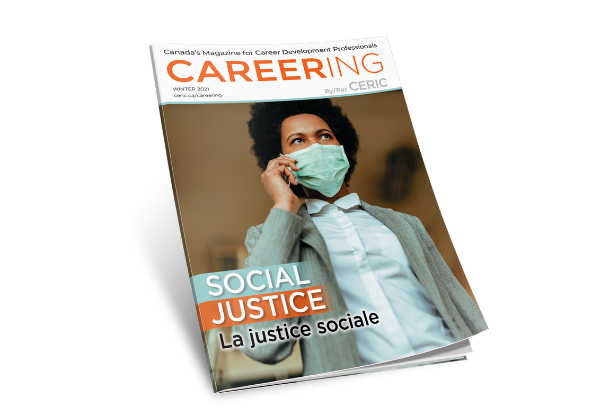
Applying universal design as a pathway to inclusive career education
January 19, 2021
Winter 2021 issue of Careering focuses on social justice
January 20, 2021These questions for career professionals call for intentional action to address anti-Black racism
Tracey Lloyd

Career development professionals have traditionally supported their clients in navigating periods of ambiguity and anxiety, whether it be a transition from school to work, job loss, career change or upskilling. Some work with those from underrepresented groups already displaced and disadvantaged in the labour market. The pandemic is deepening the social and economic divide, causing career professionals to feel challenged in their capacity to instill hope and be of service to their clients.
Many organizations have responded to public pressure to address anti-Black racism. While institutions have a responsibility to develop inclusive policies and practices to enhance the lives of marginalized groups, career development professionals also have an important role in facilitating meaningful career and employment opportunities for their clients. Whatever position you hold in the field, I invite you to consider some questions that call for deeper awareness, intentional action and personal accountability. I will share some reflections on the root causes and systemic factors that limit career success for Black people, the impact of recent world events and social justice movements on career conversations, and the critical role of advocacy and employer engagement.
Understand the context
Hirschi (2012) describes four capabilities necessary for career success:
- Identity resources: A person’s aspirations and sense of themselves in relation to work;
- Human capital: Acquired knowledge and skills;
- Social resources: Personal relationships and professional connections; and
- Psychological resources: Levels of optimism, hope and resilience.
Anti-Black racism affects the development of these capacities for many of our clients. Numerous studies have documented the impact of racism and the disparity in educational, employment and health outcomes for diverse Black communities in Canada (Environics Institute, 2017, 2019; Maynard, 2018; Government of Canada, 2020). The Black experience continues to be affected by systems of oppression rooted in colonialism and white supremacy.
More from Careering
Diversity in corporate sponsorship critical to help talent rise
Hiring a Chief Diversity Officer isn’t enough to make workplaces safer for racialized employees
Anti-racism from the inside out: Challenging white supremacy in the workplace
In applying Hirschi’s four career resources in my own work, I consider the Black experience in the educational system, which is shaped by low teacher expectations, academic streaming, disproportionately higher suspension, expulsion and drop-out rates. Lack of representation in the curriculum and the classroom affect career identity. I am also mindful of the impact of the socio-political climate and media images of the Black community on a person’s perception of self, feelings of belonging, hope and overall psychological well–being. As Hooley (2020) asserts, “Our careers are not just an expression of our psychology or personal will; they are embedded in social structures.”
Career conversations with your Black clients must be grounded in an appreciation of the history and context affecting their career outcomes. It also requires an understanding of positionality – in other words, one’s identity, social location and worldview. How does your own positionality and privilege influence your work as a career development professional? How does this understanding of history and the Black experience show up in your practice? How comfortable are you engaging clients in conversations about their fears of discrimination?
Challenge the system
McMahon, Arthur and Collins (2008) remind us of the historical relationship between career development practice and social justice reform. The authors call upon professionals to examine the social, economic and political contexts of their work. We are encouraged to balance our attention on the individual with a more critical assessment of the systems that determine access, status and career outcomes. Hooley (2020) advances that sometimes clients are helped by individual supports, other times by system change, but more often by both at the same time. How might your approach to career guidance be endorsing standards of the dominant culture and what is the message conveyed to your clients?
“How does your own positionality and privilege influence your work as a career development professional?”
In order to ensure representation and foster a sense of belonging for Black clients, consider the composition of your team, career events, and the images and language that are more prevalent in your promotional and learning materials. What names do you typically use on resume samples? What faces are reflected in program brochures and PowerPoint presentations? If clients are part of your service–delivery model, are Black student leaders or peer helpers engaged? Do you involve Black professionals, industry experts and alumni in career events? I encourage facilitators of these sessions to pose equity–related questions to guest speakers, because some of your Black clients may be uncomfortable raising their concerns.
Employer engagement is also a critical component of our work and allows us to address systemic bias in recruitment and retention. Career services need to rethink their approach to employer relations by asking questions such as: How do you assess an employer’s commitment to anti-oppressive practice? How do you respond to employers that discriminate? What resources can we develop to support clients in assessing a prospective employer’s commitment to anti-Black racism?
Career services should also collect race-based data and engage in regular evaluation to assess the effectiveness of programming. Evaluation data will reveal who is participating, the quality of the experience and the outcomes for Black clients. Some important metrics to guide data collection are:
- The rate at which Black clients are securing jobs and placements compared to other groups
- The types of opportunities they are securing and their experience on placement
- The quality of supervision
Refusal to collect and reflect critically on race-based data upholds systemic racism. Challenging the system means that we continually question the structures we work within, interact with and promote as career development professionals.
Cultivate strengths
The career conversation is inherently relational and aimed at unearthing the strengths of the client. Belief in oneself is linked to success. In maintaining positive regard for the client, the career development professional helps to strengthen this belief and conveys what Amundson (2018) refers to as “mattering” to the client.
Challenging our own assumptions and again being mindful of our own positionality and unconscious bias will allow us to move toward more meaningful career development interventions at both the individual and systems level. As a result, the client’s career aspirations and sense of possibilities will naturally expand. A social justice orientation in our work drives us to facilitate professional connections, quality work experiences, valuable mentorship and enlist supervisors as champions to ensure that members of marginalized groups can be successful. This is particularly important for Black clients, who are often the minority in many work environments.
Continue the conversation
Career development is a social justice imperative. I close with Hooley’s (2020) five signposts: build critical consciousness, name oppression, question what is normal, encourage people to work together and work at a range of levels. For me, this continues to be a reflective exercise and learning journey in considering my work and leadership in the field.
Although what I have shared is also relevant to other marginalized groups, I elected to focus on the Black experience to ensure that it is not lost in the larger equity, diversity and inclusion conversation. Within current frameworks, Black clients and students remain at a disadvantage. My hope is that the questions posed throughout encourage a critical view of our practice and highlight our role as career professionals in elevating the career conversation and enhancing career outcomes for diverse Black communities.
Tracey Lloyd is the Director of Career Services and Co-operative Education at Centennial College, located in Toronto. Prior to joining Centennial, Lloyd was the Director of Employment Programs at Tropicana Community Services. She also taught in the Career and Work Counselling program at George Brown College. Lloyd holds a PhD in Adult Education from OISE/ University of Toronto.
References
Amundson, N.E. (2018). Active Engagement: The being and doing of career counselling, anniversary edition. Richmond, B.C: Ergon Communications.
Environics Institute (2017). The Black Experience Project in the GTA. Toronto, Ontario. environicsinstitute.org/docs/default-source/project-documents/black-experience-project-gta/black-experience-project-gta—1-overview-report.pdf?sfvrsn=553ba3_2
Environics Institute and Canadian Race Relations Foundation. (2019). Race Relations in Canada: A survey of Canadian public opinion and experience. Toronto, Ontario. crrf-fcrr.ca/images/Race_Relations_in_Canada_2019_Survey_-_FINAL_REPORT_ENGLISH.pdf
Government of Canada. (2020). Social Determinants and Inequities in Health for Black Canadians: A snapshot. Ottawa, Ontario. canada.ca/content/dam/phac-aspc/documents/services/health-promotion/population-health/what-determines-health/social-determinants-inequities-black-canadians-snapshot/health-inequities-black-canadians.pdf
Hirschi, A. (2012). The Career Resources Model: An integrative framework for career counsellors. British Journal of Guidance & Counselling, Vol. 40(4), 369-383. http://dx.doi.org/10.1080/03069885.2012.700506
Hooley, T. (2020, January 26th). Career Development and Social Justice: Developing emancipatory practice. Cannexus 2020 Conference, Ottawa, Ontario. cannexus.ceric.ca/?page_id=1770&limit=&q=tristram+hooley&catid=23
Maynard, R. (2018). Policing Black Lives: State violence in Canada from slavery to present. Black Point, Nova Scotia: Fernwood Publishing.
McMahon, M., Arthur, N., & Collins, S. (2008). Social Justice and Career Development: Views and experiences of Australian career development practitioners. Australian Journal of Career Development, 17(3), 15-25.

